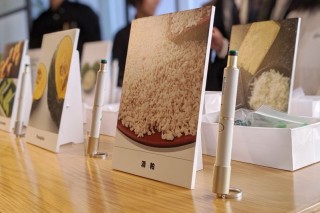Loading
Search
▼ Heat-Not-Burn Tobacco Competition Heats Up Before Law Revision
- Category:Other
TOKYO (Jiji Press) — Competition is intensifying in Japan’s fast-growing market for heat-not-burn tobacco products, which account for over 20% of the country’s overall tobacco sales, including cigarettes.
While the number of tobacco users in Japan has halved over the last three decades, heat-not-burn tobacco products are gaining popularity as they are free of smoke and ash.
Four major players in the heat-not-burn tobacco market are releasing new products and cutting prices for existing ones, ahead of the full implementation next April of a revised health promotion law for tougher rules to prevent passive smoking.
Philip Morris Japan Ltd. has recently launched the IQOS 3 Duo heat-not-burn device, priced at ¥9,980. The newest model in the IQOS series, which is said to have a 70% share in Japan, takes half the charging time that previous models do.
Through the new product’s rollout, the company aims to further increase the number of IQOS users, which has topped 5 million since the series hit the Japanese market in 2014.
Last month, British American Tobacco Japan Ltd. released two products including the ¥4,980 “glo pro” model, which can switch to high-heat mode.
Japan Tobacco Inc.’s Ploom TECH+ product, released this year with a price tag of ¥4,980, is designed to improve user experience with lower heat.
Japan Tobacco is also aiming to attract a broader range of customers by promoting various flavor-added tobacco capsules for its Ploom TECH devices.
Meanwhile, Imperial Tobacco Japan K.K. made a full-scale entry into the domestic heat-not-burn market in October.
The move prompted the three existing market players to lower prices for older models of their heat-not-burn products, according to industry sources.
“We aim to lower the hurdle for starting to use heat-not-burn devices while aggressively marketing highly profitable tobacco products [used with the devices],” said a source at one of the heat-not-burn product makers.
Compared with conventional tobacco products, heat-not-burn products contain relatively small amounts of nicotine and carcinogens. But experts still warn of health risks from using heat-not-burn products, including those posed to others through passive smoking.
With the shift from cigarettes to heat-not-burn products expected to continue among tobacco lovers, competition seems likely to further heat up in Japan, which accounts for about 60% of the global heat-not-burn tobacco market.
- November 30, 2019
- Comment (0)
- Trackback(0)


